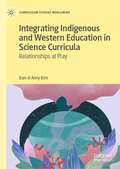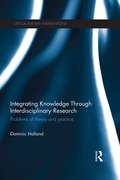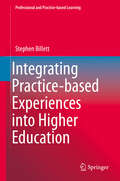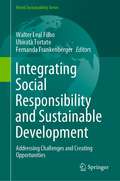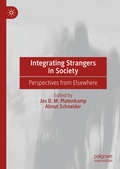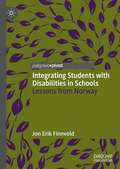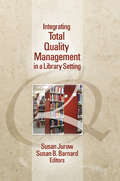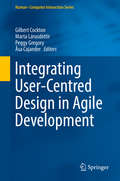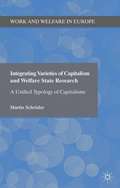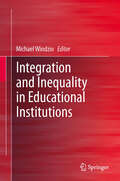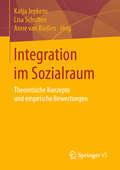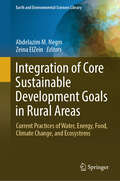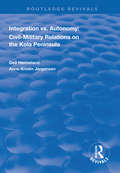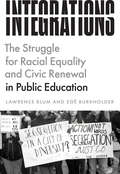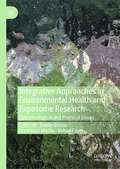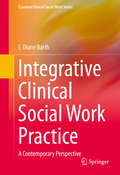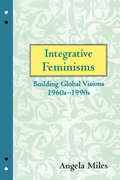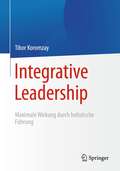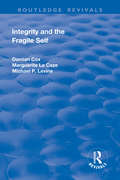- Table View
- List View
Integrating Indigenous and Western Education in Science Curricula: Relationships at Play (Curriculum Studies Worldwide)
by Eun-Ji Amy KimThis book explores diverse relationships at play in integrating Indigenous knowledges and Western Science in curricula. The readers will unravel ways in which history, policy, and relationships with local Indigenous communities play a role in developing and implementing ‘cross-cultural’ science curricula in schools.Incorporating stories from multiple individuals involved in curriculum development and implementation – university professors, a ministry consultant, a First Nations and Métis Education coordinator, and most importantly, classroom teachers – this book offers suggestions for education stakeholders at different levels.Focusing on the importance of understanding ‘relationships at play’, this book also shows the author’s journey in re/search, wherein she grapples with both Indigenous and Western research frameworks. Featuring a candid account of this journey from research preparation to writing, this book also offers insights on the relationships at play in doing re/search that respects Indigenous ways of coming to know.
Integrating Knowledge Through Interdisciplinary Research: Problems of Theory and Practice (Critical Realism: Interventions (Routledge Critical Realism))
by Dominic HollandIn this important new text, Holland seeks to explain, by means of social scientific and philosophical inquiry, the difficulties that researchers often experience when attempting to integrate knowledge from different academic disciplines, either individually or as part of a team of subject specialists. It is argued that the difficulty of integrating knowledge from different academic disciplines is the result of, firstly, an inadequate justification of the nature of scientific integration and differentiation and, secondly, the dominance of disciplinary specialization in scientific inquiry. By focusing on both the theoretical justification for, and the practical feasibility of, integrating knowledge through interdisciplinary research, this book asks what properties of reality make the integration of knowledge from different academic disciplines possible and to what extent it is feasible to integrate knowledge through interdisciplinary research within a traditional, disciplinary context. Accordingly the text is both philosophical and social scientific in content: philosophical in the sense that it presents a theory of causal determination, which will help researchers to understand how reality is both differentiated and interconnected; social scientific in the sense that it presents the results of three case studies of collaborative interdisciplinary research projects. The book is heavily informed by the philosophy of critical realism. The philosophical argument about the possibility of integration and specialization in science draws explicitly on some of the key concepts of critical realism – particularly those comprising the theory of ‘integrative pluralism’ – while critical realist assumptions underpin the social scientific argument about the causal influence of the social system of knowledge production. By exploring researchers’ conceptions of knowledge and of reality on the one hand and their decisions about what sort of knowledge to produce on the other, Holland shows how the difficulty of scientific integration is both a problem of knowledge and a problem of knowledge production. This book is essential reading for students and academics interested in the emerging topic of knowledge integration and interdisciplinarity.
Integrating Practice-based Experiences into Higher Education
by Stephen BillettThis book advances understandings about and practices for effectively integrating practice-based (e. g. workplace) experiences in higher education programs. This issue is becoming of increasing salient because higher education programs globally are increasingly focussing on preparing students for specific occupations. Such imperatives are reflected in the cooperative education movement in North America, the foundation degree programs of the United Kingdom, the work integrated learning approach within Australian higher education and initiatives in a range of other countries. There are clear and growing expectations that graduates from such should be able to move smoothly into being effective in their occupational practice. These expectations rise from the imperatives and interest of government, employers, community and students themselves. The book achieves a number of important goals. Firstly, it identifies and delineates the educational worth of students and engagement in practice-based experiences and their integration within their programs of study. Secondly, it advances conceptions of the integration of such experiences that is essential to inform how these programs might be enacted. Thirdly, drawing on the findings of two teaching fellowships, it proposed bases and propositions for how experiences in higher education programs might be organised and augmented to support effective learning. Fourthly pedagogic practices seen to be effective in maximising the learning from those practice experiences and integrating them within the curriculum are identified and discussed. Fifthly, a particular focus is given to students' personal epistemologies and how these might be developed and directed towards supporting effective learning within practice settings and the integration of that learning in their university programs.
Integrating Social Responsibility and Sustainable Development: Addressing Challenges and Creating Opportunities (World Sustainability Series)
by Walter Leal Filho Fernanda Frankenberger Ubiratã TortatoThis book is a truly interdisciplinary publication, useful to scholars, social movements, practitioners and members of governmental agencies and private companies, undertaking research and/or executing projects focusing on social responsibility and sustainability from across the world.Sustainable development has become a matter of central concern to both public institutions and enterprises. Indeed, for many companies, a due emphasis to environmental issues is not only positive from the point of view of environmental gains, but also to the image of the business. Often, but not always, this is reflected in the preparation of formal strategies and programmes, which entail their institutional strategies and visions. The wide area of social responsibility, often known as Corporate Social Responsibility (CSR), entails elements of social equality and environmental accountability, and eco-efficiency. Due to their complexity, the interrelations between social responsibility and sustainable development need to be better understood. There is also a real need to showcase successful examples of how public institutions and companies are handling their sustainability challenges. It is against this background that this book has been produced.
Integrating Strangers in Society: Perspectives from Elsewhere
by Jos D. M. Platenkamp Almut SchneiderThis book provides a uniquely positioned contribution to the current debates on the integration of immigrants in Europe. Twelve social anthropologists—“strangers by vocation”—reflect upon how they were taken in by those they studied over the course of their long-term fieldwork. The societies concerned are Sinti (northern Italy), Inuit (Canadian Arctic), Kanak (New Caledonia), Māori (New Zealand), Lanten (Laos), Tobelo and Tanebar-Evav (Indonesia), Banyoro (Uganda), Gawigl and Siassi (Papua New Guinea) and a township in Odisha (India). A comparative analysis of these reflexive, ethnographic accounts reveals as yet underrepresented, non-European perspectives on the issue of integrating strangers, enabling the reader to identify and reflect upon the uniquely Western ideals and values that currently dominate such discourse.
Integrating Students with Disabilities in Schools: Lessons from Norway
by Jon Erik FinnvoldThis book explores the ability of the Norwegian school system to support the achievement of formal competencies among children with physical disabilities, as well as its role in the informal dimensions of social participation and networking. Schools contribute to social inclusion in several ways: they are arenas for building official competencies, ensuring future access and success in the labour market. They are also sites for meeting other children, and developing friendships – friendships are not only important for strengthening cognitive development, but are vital to both good mental health and the building of various forms of social capital. By examining schools and the ways in which inclusion is incorporated early, this book aims to bridge the opportunity and employment gap that people with physical disabilities are more likely to face later in life.
Integrating Total Quality Management in a Library Setting
by Susan Jurow Susan BarnardImprove the delivery of library services by implementing total quality management (TQM), a system of continuous improvement employing participative management and centered on the needs of customers. Although TQM was originally designed for and successfully applied in business and manufacturing settings, this groundbreaking volume introduces strategies for translating TQM principles from the profit-based manufacturing sector to the library setting. Integrating Total Quality Management in a Library Setting shows librarians how to improve library services by implementing strategies such as employee involvement and training, problem-solving teams, statistical methods, long-term goals and thinking, and an overall recognition that the system (not the staff) is responsible for most inefficiencies.Total Quality Management in a Library Setting describes the principles of TQM, its origins, and the potential benefits and barriers to be expected when adopting quality management approaches in libraries. Chapters provide guidelines for planning and implementation to help libraries use total quality management to break down interdepartmental barriers and work on continuously improving library services. The contributors, who have begun to think about using or who are already using TQM in a library setting, present specific planning and implementation issues that can be put to immediate use in libraries. With this innovative book, library managers will learn that by working together on problem solving teams to address specific operational questions, and by developing a shared knowledge of problem-solving tools and techniques, staff members grow personally and gain a larger sense of organizational purpose. Other TQM methods introduced in this book include the concept of the internal customer, which teaches staff to recognize how other staff members use the results of their work, and the principle of continuous improvement, which enables libraries to set measurable goals based on quantitative performance indicators, and to monitor progress toward those goals.
Integrating User-Centred Design in Agile Development
by Gilbert Cockton Marta Lárusdóttir Peggy Gregory Åsa CajanderThis book examines the possibilities of incorporating elements of user-centred design (UCD) such as user experience (UX) and usability with agile software development. It explores the difficulties and problems inherent in integrating these two practices despite their relative similarities, such as their emphasis on stakeholder collaboration. Developed from a workshop held at NordiCHI in 2014, this edited volume brings together researchers from across the software development, UCD and creative design fields to discuss the current state-of-the-art. Practical case studies of integrating UCD in Agile development across diverse contexts are presented, whilst the different futures for UCD and other design practices in the context of agile software development are identified and explored. Integrating User Centred Design in Agile Development will be ideal for researchers, designers and academics who are interested in software development, user-centred design, agile methodologies and related areas.
Integrating Varieties of Capitalism and Welfare State Research: A Unified Typology of Capitalisms (Work and Welfare in Europe)
by Martin SchröderThis book combines the two most important typologies of capitalist diversity; Esping-Andersen's welfare regime typology and Hall and Soskice's 'Varieties of Capitalism' typology, into a unified typology of capitalist diversity. The author shows empirically that certain welfare states bundle together with certain production systems.
Integration and Inequality in Educational Institutions
by Michael WindzioThis volume addresses questions that lie at the core of research into education. It examines the way in which the institutional embeddedness and the social and ethnic composition of students affect educational performance, skill formation, and behavioral outcomes. It discusses the manner in which educational institutions accomplish social integration. It poses the question of whether they can reduce social inequality, - or whether they even facilitate the transformation of heterogeneity into social inequality. Divided into five parts, the volume offers new insights into the many factors, processes and policies that affect performance levels and social inequality in educational institutions. It presents current empirical work on social processes in educational institutions and their outcomes. While its main focus is on the primary and secondary level of education and on occupational training, the book also presents analyses of institutional effects on transitions from vocational training into tertiary educational institutions in an interdisciplinary and internationally comparative approach.
Integration and Peace in East Africa: A History of the Oromo Nation
by Tsega EtefaThis book analyzes the development of indigenous religious, commercial, and political institutions among the Oromo mainly during the relatively peaceful two centuries in its history, from 1704 to 1882. The largest ethnic group in East Africa, the Oromo promoted peace, cultural assimilation, and ethnic integration.
Integration im Sozialraum: Theoretische Konzepte und empirische Bewertungen
by Anne Van Rießen Katja Jepkens Lisa ScholtenIn dem Band werden die Zusammenhänge von Sozialraum, Migration und Integration systematisch aus theoretischen und empirischen Perspektiven in ihren Interdependenzen beschrieben. Fluchtmigration und Integration werden im Kontext sozialräumlicher Ansätze analysiert, erforderliche Theorie-Praxis-Transfers reflektiert und theoretische Konzepte durch empirische Studien begründet. Die sozialräumliche Perspektive fokussiert hierbei die relevanten Handlungsfelder der Integration: Kommunale Integrationspolitiken, Unterbringung und Wohnen, Bildung, Erwerbsarbeit und Zivilgesellschaftliches Engagement.
Integration of Core Sustainable Development Goals in Rural Areas: Current Practices of Water, Energy, Food, Climate Change, and Ecosystems (Earth and Environmental Sciences Library)
by Abdelazim M. Negm Zeina ElZeinThis book addresses the application of the water, energy and food nexus in the MENA Region. It highlights the technologies and solutions to support the sustainable development of rural areas in the region. The first part provides an introduction and an overview of water, energy food, climate change, and ecosystem interactions within the framework of sustainable development goals. The editors present a brief overview and highlights of the book themes and chapters. The second part discusses current State and Security of the WEF Nexus in the MENA Region, addresses the role of water, energy and food nexus in sustainable development through reviewing case studies in the MENA Region that have followed an integrated nexus approach. The third part focuses on the integration within the Nexus for Rural Development, includes three chapters. It discusses analysis and assessment of the nexus through a quantitative index approach to consider the efficiency and security of resources; addresses territorial climate planning in water-scarce areas, focusing on the Souss Massa Region in Morocco; and discusses the Algerian food system and future scenarios through the lens of food and water challenges. The fourth part addresses the WEF Nexus and sustainable development solutions and technologies; exploration of an adaptation model for food security and water resources, water-agricultural management practices; standardized hydraulic incident index to analyze hydraulic incidents and their impact on energy; integrated management of natural resources in Egypt through the WEF nexus approach; and ICT tools as a facilitator for collaborative governance of water resources in Mediterranean agriculture. The fifth chapter focuses on sediment management in the context of climate change for the Fertile Crescent and Southwest Asia, and the Nile River. It also addresses haloculture as a climate change adaptation and mitigation solution, that supports food security. Finally, the book presents key updates, conclusions and recommendations from the book chapters. The book is useful to researchers, professionals, practitioners, post-graduates and undergraduates who are interested in the field of sustainable development and water, energy and food interaction.
Integration von religiöser Vielfalt durch Religion?: Der Einfluss und Stellenwert religiöser Orientierungen bei der Wahrnehmung von religiöser Vielfalt und Muslimen (Veröffentlichungen der Sektion Religionssoziologie der Deutschen Gesellschaft für Soziologie)
by Nils FriedrichsDas Buch untersucht die Strukturen hinter den Einstellungen zu religiöser Vielfalt und zu Muslimen in Deutschland und geht der Frage nach, wie Religiosität diese Einstellungen beeinflusst. Es zeigt sich, dass Toleranz als eigenständige Haltung lediglich existiert, wenn es um Religionsvielfalt im Allgemeinen geht, nicht jedoch in Bezug auf Muslime. Religiosität wirkt dabei äußerst ambivalent. Hochreligiöse neigen zur Betonung des Wahrheitsanspruchs ihrer Religion, Atheisten sind tendenziell religionskritisch, weshalb beide Gruppen Muslime und religiöse Vielfalt eher negativ bewerten. Ist die Religiosität nicht dogmatisch, sind andere Faktoren wie z. B. Deprivation, politische Einstellungen oder Intergruppenkontakt wichtiger.
Integration vs. Autonomy: Civil-military Relations on the Kola Peninsula (Routledge Revivals)
by Geir Hønneland Anne-Kristin JørgensenPublished in 1999. On the basis of leading theoretical work on civil-military relations, the authors elaborate their own model, emphasising the continuum between military autonomy (which has traditionally characterised the military sector in Russia) and integration with civil society (which one might expect would be the result of the political changes having taken place in Russia over the past decade). Three Indicators of this relation are selected; the participation of military personnel in civilian life, and it particular politics; the status of closed cities; conversation of military industry to civilian production. These indicators are investigated at the federal level and at the regional level pertaining to Murmansk oblast’ (the Kola Peninsula), which is one the most heavily militarised areas of the world. The study is based on intensive ‘on-the-spot’ data gathering in Murmansk, including interviews with officers, redundant officers and inhabitants of such closed cities.
Integrations: The Struggle for Racial Equality and Civic Renewal in Public Education (History and Philosophy of Education Series)
by Lawrence Blum Zoë BurkholderThe promise of a free, high-quality public education is supposed to guarantee every child a shot at the American dream. But our widely segregated schools mean that many children of color do not have access to educational opportunities equal to those of their white peers. In Integrations, historian Zoë Burkholder and philosopher Lawrence Blum investigate what this country’s long history of school segregation means for achieving just and equitable educational opportunities in the United States. Integrations focuses on multiple marginalized groups in American schooling: African Americans, Native Americans, Latinxs, and Asian Americans. The authors show that in order to grapple with integration in a meaningful way, we must think of integration in the plural, both in its multiple histories and in the many possible definitions of and courses of action for integration. Ultimately, the authors show, integration cannot guarantee educational equality and justice, but it is an essential component of civic education that prepares students for life in our multiracial democracy.
Integrations: The Struggle for Racial Equality and Civic Renewal in Public Education (History and Philosophy of Education Series)
by Lawrence Blum Zoë BurkholderThe promise of a free, high-quality public education is supposed to guarantee every child a shot at the American dream. But our widely segregated schools mean that many children of color do not have access to educational opportunities equal to those of their white peers. In Integrations, historian Zoë Burkholder and philosopher Lawrence Blum investigate what this country’s long history of school segregation means for achieving just and equitable educational opportunities in the United States. Integrations focuses on multiple marginalized groups in American schooling: African Americans, Native Americans, Latinxs, and Asian Americans. The authors show that in order to grapple with integration in a meaningful way, we must think of integration in the plural, both in its multiple histories and in the many possible definitions of and courses of action for integration. Ultimately, the authors show, integration cannot guarantee educational equality and justice, but it is an essential component of civic education that prepares students for life in our multiracial democracy.
Integrations: The Struggle for Racial Equality and Civic Renewal in Public Education (History and Philosophy of Education Series)
by Lawrence Blum Zoë BurkholderThe promise of a free, high-quality public education is supposed to guarantee every child a shot at the American dream. But our widely segregated schools mean that many children of color do not have access to educational opportunities equal to those of their white peers. In Integrations, historian Zoë Burkholder and philosopher Lawrence Blum investigate what this country’s long history of school segregation means for achieving just and equitable educational opportunities in the United States. Integrations focuses on multiple marginalized groups in American schooling: African Americans, Native Americans, Latinxs, and Asian Americans. The authors show that in order to grapple with integration in a meaningful way, we must think of integration in the plural, both in its multiple histories and in the many possible definitions of and courses of action for integration. Ultimately, the authors show, integration cannot guarantee educational equality and justice, but it is an essential component of civic education that prepares students for life in our multiracial democracy.
Integrative Approaches in Environmental Health and Exposome Research: Epistemological and Practical Issues
by Élodie Giroux Francesca Merlin Yohan FayetResearch on the relationship between health and the environment in a postgenomic context is increasingly aimed at understanding the various exposures as a whole, simultaneously taking into account data pertaining to the biology of organisms and the physical and social environment. Exposome research is a paradigmatic case of this new trend in environmental health studies. This book takes a multidisciplinary approach focusing on the conceptual, epistemological, and sociological reflections in the latest research on environmental and social determinants of health and disease. It offers a combination of theoretical and practical approaches and the authors are scholars from a multidisciplinary background (epidemiology, geography, philosophy of medicine and biology, sociology). Crucially, the book balances the benefit and cost of the integration of biological and social factors when modelling aetiology of disease.
Integrative Clinical Social Work Practice
by F. Diane BarthIn recent history the practice of medicine and mental health has been increasingly eclectic as more and more practitioners harness seemingly disparate therapies and techniques to arrive at clinical breakthroughs. But while social work professionals have been involved in integrative practice informally and intuitively for years, resources to bring structure to this therapeutic concept have been few and far between. In response, Integrative Social Work Practice offers innovative ways of conceptualizing cases, communicating with clients and making better therapeutic use of client individuality. Rich in research, evidence-based and clinical material from a variety of settings, the book begins with the basic organizing principles behind effective integrative practice. Real-world examples flesh out the theoretical rationales and psychodynamic, cognitive, behavioral and developmental methods are shown in practical context. The author also demonstrates how to balance flexibility and boundaries and manage diverse and even conflicting theories, while providing clear guidelines on: Integrating key psychotherapeutic approaches into social work. Using somatic knowledge to enhance therapy. Making assessments and choosing interventions. Applying an integrative approach to therapeutic relationships. Creating manageable goals based on small steps. Building and working with an integrative team. An important step forward in both professional development and the larger therapeutic picture, Integrative Social Work Practice benefits researchers and practitioners as well as supervisors and students in social work and counseling.
Integrative Feminisms: Building Global Visions, 1960s-1990s
by Angela MilesIntegrative Feminisms presents a unique discussion of feminist radicalism in North America in the context of feminism's global development since the 1960s. Across divergent agendas, Angela Miles illuminates the transformative power common to apparently diverse radical, eco-, Black, socialist, lesbian and "third world" feminists. Drawing on interviews with activists, historical and documentary research, and her own participation, the book delivers a unique and powerful analysis of concentric feminisms in a transnational context.
Integrative Leadership: Maximale Wirkung durch holistische Führung
by Tibor KoromzayDieses praxisbezogene Fachbuch Integrative Leadership erklärt, wie durch eine umfassende und integrative Perspektive eine ganzheitliche Führung ermöglicht wird, die weit über das bloße Führen von untergebenen Mitarbeitenden hinausgeht. Dadurch kann die Wirkung von Leadership massiv erhöht werden. Sie erfahren, wie verschiedene Aspekte von Leadership integral aufeinander ausgerichtet und somit Reibungsverluste vermindert werden können. Denn wer kennt dies nicht: Organisationen werden durch die Spezialisierung von Funktionen zunehmend fragmentiert. Dabei geht die Gesamtschau verloren, und es entstehen unkoordinierte Kräfte, die in verschiedene Richtungen zielen. Der Autor zeigt auf, wie diese Fragmente zu einem wirkungsvollen Ganzen zusammengefügt werden können. Basierend auf sechs Dimensionen von Leadership erhalten Sie eine Hilfestellung, um durch die Bündelung dieser Dimensionen ein Vielfaches an Wirkung zu erzielen. Dies unterstützt Sie dabei, Organisationen zu inspirierenden Orten zu machen und nachhaltige und positive Veränderungen zu generieren. Zielgruppen: Führungskräfte, Organisationsentwickler*innen, Berater*innen, Coaches, und Wirtschafts- und Organisationspsycholog*innen. Der Autor: Tibor Koromzay ist freiberuflich als Organisationsberater und Coach tätig mit den Schwerpunkten Leadership, Zusammenarbeit, Veränderung und persönliches Wachstum. Er ist Psychologe, verfügt über langjährige Führungs- und Managementerfahrung in der Industrie und langjährige Übungspraxis in Meditation und Aikido.
Integrative Tools für die Team- und Organisationsdiagnose
by Sabine Pelzmann Bettina StrümpfKernstück des Buches sind konkrete Tools, die zur Team- und Organisationsdiagnose eingesetzt werden können. Vorgestellt werden dabei die Prinzipien des Integrativen Ansatzes (Hilarion G. Petzold) sowie ausgewählte Aspekte der Organisationsdiagnose. Das Buch richtet sich an Supervisor/innen, Coaches, Organisationsberater/innen, Unternehmensberater/innen und Personalentwickler/innen.
Integrity and Sustainability in Sport: Business, Environmental and Social Goals (Routledge Research in Sport Business and Management)
by Rob Wilson Daniel Rhind Tiberio Daddi Chris Horbel Stella Leivadi Timothy Kellison James Esson Agostino Vollero Argyro Elisavet Manoli Daniel Plumley Renan Petersen-Wagner Ioannis Konstantopoulos Lyndsey Fox Thadeu Gasparetto John Goedee John Hie Tero Kalsta Dimitrios Kolyperas Niki Koutrou Nanny Kuijsters-Timmers Roger Leenders Niccolò Maria Todaro Carolynne Mason Alessio Novi Riikka Rakic Bob Ramsak Josephine Traberg Eugenia Tzoumaka Serhat YilmazThis is the first book to examine the critically important topic of sustainability in sport through the lens of integrity. Adopting a holistic view on sustainability, it argues that integrity is the foundation on which sustainable sports organisations, actions and processes must be built.This book shows how the interconnected values of integrity and sustainability can be embedded in sporting organisations, policies and activities. Featuring the work of leading sport researchers from around the world, this book first presents a conceptual model and a framework for understanding sustainability and integrity as applied to sport. It then examines these concepts in the context of sport business, the natural and built environments and wider society, covering important contemporary issues such as mega‑events, legacy, sport governance, climate justice, sport stadia, sport for development, sport sponsorship and marketing and corporate social responsibility.Presenting cutting‑edge research and challenging sport practitioners to consider how to embed integrity and sustainability in their everyday work, this book is important reading for any student, researcher, practitioner or policymaker with an interest in sport, sustainable development and integrity.
Integrity and the Fragile Self
by Damian Cox Marguerite La Caze Michael P. LevineThis title was first published in 2003. What does it take to be a person of integrity? Could those who commit morally horrendous acts be persons of integrity? Is personal integrity compatible with the kinds of ambivalence and self-doubt characteristic of fragile selves and ordinary lives? This text examines the centrality of integrity in relation to a variety of philosophical and psychological concerns that impinge upon the ethical life. Relating integrity to many standard issues in philosophical and moral psychology - such as self-deception, weakness of will, hypocrisy and relationships - the authors present a comprehensive and accessible study of integrity and its types. Drawing on contemporary work in moral and philosophical psychology, ethics, theories of the self and feminist thought, this book develops an account of integrity as a fundamental virtue - as something that is central to all our lives.
